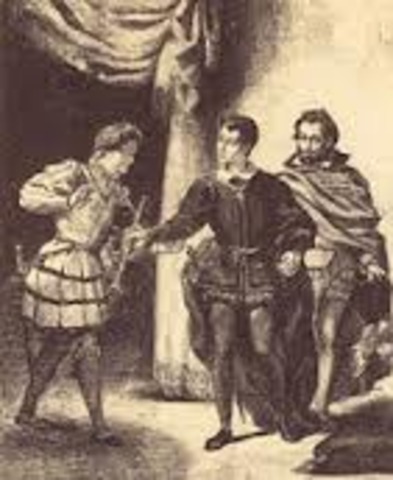

Such knowledge is too much for her and she commits suicide in the very garden in which she first heard Brutus' secrets. In Act II, Scene 4 Portia complains that she has "a man's mind, but a woman's might." She has been given access to a man's knowledge but because of her position as a woman, she is unable to use it and must sit and wait for the outcome of men's affairs. Unfortunately for Portia, the knowledge that he imparts is her downfall. She changes his mind by pressing him to define her in one of the two ways in which a woman can be defined in this society: She is either a good Roman woman worthy of his secrets, well-wived and well-fathered, or she is "Brutus' harlot." Faced with this distinction, Brutus can only choose to tell her what is happening. Brutus does not want her to know what is going on. She speaks openly with him about the unrest he has recently exhibited and forces him to speak to her and tell her what is going on. Her relationship with her husband is clearly one of intimacy and respect. Portia is a much more interesting character on her own and yet she, too, is really only portrayed through her relationship with men.

"t were a mock / Apt to be rendered for someone to say / 'Break up the Senate till another time, / When Caesar's wife shall meet with better dreams.'" On to his own death. The things that threatened me / Ne'er looked but on my back when they shall see / The face of Caesar, they are vanished." However, he is convinced, bowing to her hysteria and his mind is changed only after Decius embarrasses him. His prowess is in the past and is only momentarily evident in Act II, Scene 2 when he refuses to listen to Calphurnia's worries about what will happen if he goes to the Capitol. He has taken on too many feminine characteristics. His request of the athletic womanizer, Antony, is an indication of Caesar's own effeminacy. In fact, the implication is that Caesar is no longer potent enough to impregnate her. The implication, then, is that she is at fault for not producing an heir. Caesar asks this because Calphurnia is childless, and superstition dictates that the touch of the athlete during this holy feast will make her fertile. Caesar asks Antony to touch her as he passes her in the race that is a part of the celebrations. The reader's first contact with her is during the feast of Lupercal. For this reason, her character is not developed on a psychological level in the way that Caesar's is. By her strength, the audience sees what Caesar ought to be by her conscience, what his ought to be by her death, what he ought to be prepared to do. She exists as a foil for her husband's character. She controls instead of being controlled. The first, Calphurnia, is Caesar's wife, and is emblematic of one standard sexist Elizabethan understanding of woman. You find only two female characters in Julius Caesar. Shakespeare's suggestion is that while a balance can be struck and an ideal attained, it is ultimately unworkable. At other times, characters like Brutus gain a great deal from incorporating the feminine into their own personalities.

By the end of the play, Brutus' character is more fully-rounded but is the world he leaves us better off? Can it be when the world left behind is entirely without women? Shakespeare takes the opportunity in Julius Caesar to say both "yes" and "no." At times, characters take on so-called feminine characteristics and lose their ability to rule well. It has been reclaimed partially because his character, defined at the beginning of the play as entirely masculine, has taken on some feminine characteristics, such as grief over his wife's death, love for his friend, and tender concern for his followers. Brutus' reputation, damaged as it has been by his participation in the conspiracy, and by his rather self-deluding rationale for it, has been reclaimed. "This was a man" is Antony's final tribute to Brutus.


 0 kommentar(er)
0 kommentar(er)
